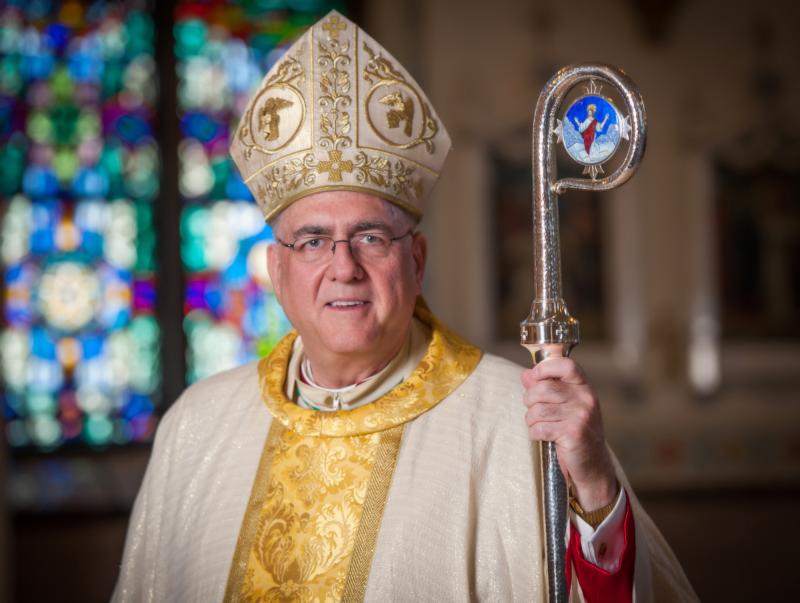
by Archbishop Joseph F. Naumann
St. Paul in his Letter to the Philippians instructs them: “Rejoice in the Lord always. I shall say it again: rejoice” (4: 4). What makes Paul’s words particularly powerful is that he is writing them from a prison cell in Ephesus.
There are always many reasons to be discouraged and even to despair. Depression is at epidemic levels in our American society. On a personal level, many of us are experiencing financial stress, dissatisfaction in the workplace, health problems for those we love and/or strained relationships with family or friends.
On a global level, we continue to contend with the pandemic, polarization and racial strife, record levels of violent crimes in our cities, devaluing of our financial resources caused by inflation, supply chain problems and apathy — if not hostility — by many in our culture to Christianity. We do not have to look very hard to find a lot of bad news that can easily dispirit us.
No matter how bad or difficult things may seem in your life, chances are that you are not reading this column from a prison cell. What motivated St. Paul to rejoice even though he had plenty of legitimate reasons to despair?
Paul understood first of all that Jesus did not promise his disciples an easy or comfortable life. In fact, Jesus told his disciples: If you want to follow me, you have to be willing to take up the cross. Our Lord did not come into this world to assure us of an upper-class, 21st-century lifestyle. Jesus did not promise a problem-free existence. Following Jesus will bring us at some point to our own Calvary.
It is true that Jesus did promise his disciples abundant life and complete joy in this world, as well as eternal life with him and the saints in heaven. However, the abundant life and complete joy Jesus promised is the fruit of following Our Lord on the path of heroic love. This will require from us sacrifice and contending with adversity. Remember, Jesus calls those blessed who are persecuted and even hated by worldly powers.
The joy that Jesus promised is not the result of a risk- and adversity-free world. The joy Our Lord offered can be experienced in a prison cell, sickbed or with few material comforts.
St. Paul told the Philippians the secret formula for Christian joy: “Your kindness should be known to all. The Lord is near. Have no anxiety at all, but in everything, by prayer and petition, with thanksgiving, make your requests known to God. Then the peace of God that surpasses all understanding will guard your hearts and minds in Christ Jesus” (Phil 4: 5-7).
Paul’s formula is fairly simple. First, do not permit anxiety to dominate your heart but trust in God’s providence. Christians believe that God can bring forth good from evil. Jesus makes our adversities opportunities for spiritual growth and a vehicle that causes our witness of the Gospel to be even more creditable, compelling and powerful.
Secondly, Paul exhorts Christians to show kindness to everyone. This includes even those who consider themselves our enemies. We can reduce stress and anxiety in our own life and polarization in our society by extending to those with whom we disagree kindness and respect.
Finally, the greatest antidote to worry and anxiety is prayer that includes intercessions and supplications but especially thanksgiving. In prayer, we can turn over to God all of the challenges and adversities that we are facing. Our prayer reminds us that we are never alone. Jesus is with us, especially at moments of difficulty and adversity.
Often, the Holy Spirit will help us discern how with God’s grace we can overcome the problems of our lives. Most importantly, when we surrender everything to God, especially our trials and tribulations, then we experience a peace that comes from knowing that God can turn for good the things we do not want and cannot change.
Most importantly, we must always and everywhere give thanks. In every circumstance, the Christian has reason to be grateful. More often than not, God provides us a means to relieve the suffering in our lives. However, even when this is not the case, our crucified Lord is inviting us to draw close to him and to share in his redeeming love.
One of the causes for anxieties is that many in our society have abandoned Christianity in general, and Catholicism in particular. This is particularly painful when family and friends have become indifferent or even hostile to faith.
People often ask: How can I bring an adult child or a sibling or a spouse back to the faith? First and foremost, pray and offer sacrifices interceding to God for your loved one to rediscover faith in Jesus.
Secondly, follow the exhortation of St. Paul to rejoice always. Authentic joy is something everyone desires.
When others see joyful Catholics, especially when we are in the midst of adversity, they find our witness to the Gospel irresistible. They will come to desire the source of our joy — namely, friendship with Jesus and abundant life in his church.
Rejoice always! Again, I say: rejoice!

